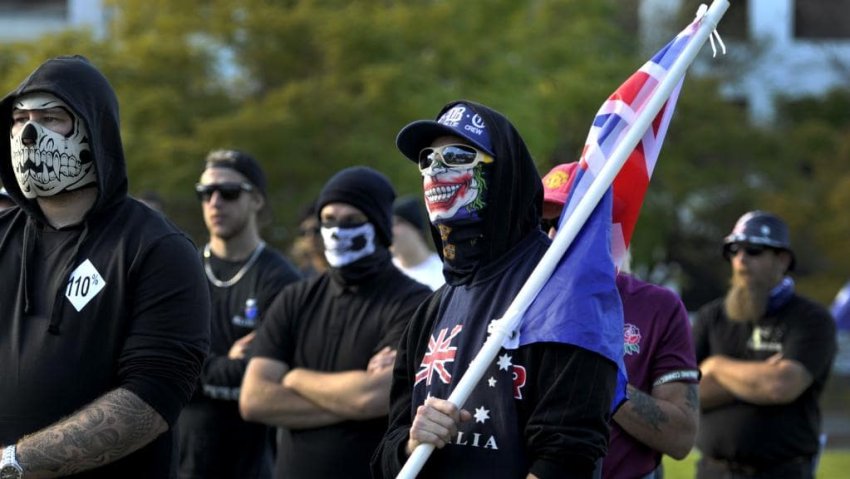
During 2018, a number of hate preachers had uninterrupted access to Australian media outlets to spread their messages of hate and intolerance far and wide. These preachers were able to do so because of the active complicity of sections of the political and media establishment.
None of the hate preachers in question, however, were Muslim — they were white. While in this day and age, the term “hate preacher” is normally associated with Islamic clerics, that description can equally be applied to the more effective hate preachers who wear suits.
In St Kilda, a south-eastern suburb of metropolitan Melbourne, a neo-Nazi rally was held on January 5 by about 150 ultra-rightists and racists. Anti-racist protesters confronted the gathering, and the original goal of the neo-fascists — to incite racial violence — was defeated.
While it is tempting to simply ignore developments like this, it is important to elaborate on the political significance of such gatherings.
The demonisation of refugees and asylum seekers, the constant attacks on immigration as a security issue and the promotion of xenophobia by the corporate media have fanned the flames of ultra-right and racist groups.
While neo-Nazi groups may be small in number and remain on the fringe, it is the complicity of the mainstream that needs to be examined.
The St Kilda rally, and the presence of a united front of disparate ultra-right groupings, is an inevitable consequence of the “Ukip-ization” of Australian politics.
British sociologist and blogger Richard Seymour originally coined this concept. UKIP, or the UK Independence Party, is a specifically British creation that emerged from the bowels of the Tory financial elite and has pushed British politics in a xenophobic and ultra-rightist direction.
We can see similar trends here in Australian politics. Stoking paranoia about Muslim immigrants as “potential terrorists” and whipping up social anxieties about refugees is not unique to UKIP, but a characteristic of the major political parties in Australia as well.
One of the hate preachers to visit Australia in 2018 was Nigel Farage, the founder and former leader of UKIP. His trip was sponsored by sympathetic Australian businesspeople and Farage was given respectful coverage in the media.
He travelled to a number of capital cities where he was able to recycle his message of vitriolic hate. He was met by enthusiastic counter-protesters who are actually confronting the politics that Farage promotes — a job the media failed to do.
The most appalling aspect of his speeches — apart from his racism — was his attempt to position himself as a defender of working people. UKIP, in a similar way to far-right parties across Europe, adopts a leftist mask to disguise its pro-business and neoliberal politics.
Farage, like many of these hate preachers, seeks to direct public anger about the inequalities and injustices of capitalism onto the most vulnerable: immigrant communities, welfare recipients and refugees.
The far right has a long history of cynically appropriating leftist-sounding phrases — even talking about “revolution” to disguise its nature as a revolt of the oligarch. Farage himself is a former investment banker and multi-billionaire who presents himself as a “rebel” against the mythical “politically correct” cosmopolitan establishment.
Another hate preacher who was able to gain a sympathetic audience in Australia was Steve Bannon, Trump’s former chief of staff and a leading alt-right “theoretician”.
Interviewed on the ABC’s Four Corners program, Bannon was basically given a free pass, with the interviewer failing to confront his racism.
Bannon went to great lengths to deny he is a racist or that his political platform contains any hint of racism. Yet at an international conference of ultra-rightist parties last year, Bannon proudly declared that he wears the label racist as a badge of honour.
Bannon is nothing if not a clever and cynical media operator. His main target in the interview was China and its supposed rising influence in Australia. Tapping into the long and dark history of anti-Asian sentiment in Australia, Bannon repeatedly stressed that Australia is the “tip of the spear” in the US’s drive against China.
While stopping short of urging a direct military confrontation, Bannon nevertheless took a belligerent stand against China, drawing on recent hysteria about a purported Chinese military presence in Vanuatu.
Never mind the hundreds of US military bases sprawling across the Asia-Pacific.
There is no shortage of home-grown hate preachers as well.
Herald Sun columnist Andrew Bolt regularly spouts his hatred for migrants. Whipping up fears about mythical “African crime gangs”, he went on record to denounce immigration as a form of colonisation.
In this endeavour, he was reflecting the thinking of major figures in the ultra-conservative Coalition government, such as current home affairs minister Peter Dutton.
Writing in The Guardian, Jason Wilson said we must call out a fascist movement, even if it is still small and disparate.
These groups may be fractured today, but with a uniting set of theories centred on racial resentment and anti-multiculturalism, these groups can combine.
Aided and abetted by political and media figures who regurgitate hysteria about immigration and refugees, these groupings can gain a wider audience.
Ignoring them would be the height of folly.
As John Passant wrote in a recent article on Independent Australia: “Ordinary workers and others have to unite around the common goal of stopping fascism from spreading and getting a bigger audience before it is too late — too late for Jews, Africans, Muslims, women and the organised working class. Unite now.”
Exactly.
[Rupen Savoulian blogs at Antipodean Atheist were a longer version of this article first appeared.]